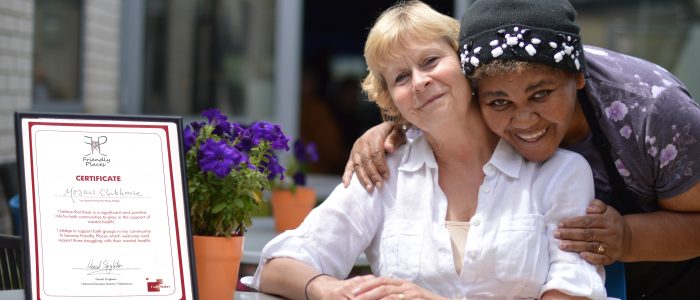Four ways to make your organisation a ‘Friendly Place’

Hopefully you’ve heard of our Friendly Places initiative – but since this is Mental Health Awareness Week, and all about the theme of relationships, we wanted to make doubly sure! Friendly Places is really an awareness-raising campaign with two faces.
On one hand, it encourages faith communities to recognise the good work that they are already doing to help support people’s mental health and wellbeing. It also gives them ideas on what they can do better – more on that below. On the other hand, it speaks to the health system, with the aim of increasing recognition of the support that is available to people in communities through faith groups, and increasing connections between health professionals and faith groups where this is appropriate.
As far as faith-based organisations go, we wanted to help them think about what the ‘mental health equivalent’ would be of putting in a ramp to help people with mobility problems access your group. What are the steps you could take to make the organisation ‘friendly’ to people experiencing mental health difficulties? We’ve developed a collection of tips and suggestions, and they are all available online along with a collection of resources, but here are the main messages:
Be alert to people who might need help.
This could mean having someone whose responsibility it is to greet and welcome people when they arrive at your group, as well as keeping a general eye out in case anyone needs someone to talk to or becomes distressed. Or it could mean making sure that people who are available to offer pastoral care or prayer are easily identifiable.
Be sensitive to people’s needs.
Where it is appropriate, this could mean reserving some seats or spaces near the door to the room so that people can slip in and out of a meeting, ceremony or service if they need to, without drawing undue attention to themselves. Another example is to see if you could train some volunteers in really good listening skills.
Provide opportunities for connection and support outside of religious meetings.
Social isolation is a huge factor in mental health. Is there a way of following up if someone is unexpectedly absent from a gathering? Is there a midweek activity (or even someone’s home) that you could invite a lonely person to? Could the family of someone who is ill do with some practical support?
Raise awareness of mental health issues in your community.
Make it okay to talk about mental health and wellbeing. One in four people will experience mental health issues over the course of a year, so every faith group will contain people affected, or their families and friends. Could you hold a discussion, or show a relevant film, or provide opportunities for people to share their stories? Could you provide information about where to go for help locally?
Finally, if you can agree to the two statements below, please add your name to them by signing the Friendly Places pledge. This doesn’t tie you into anything, or commit you to anything specific: it is simply an expression of support – although we would love to hear what action you decide to take as a result! You can sign here.
I believe that there is a significant and positive role for faith communities to play in the support of mental health.
I pledge to support faith groups in my community to become Friendly Places which welcome and support those struggling with their mental health.


